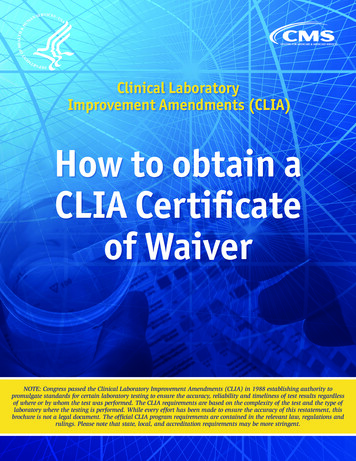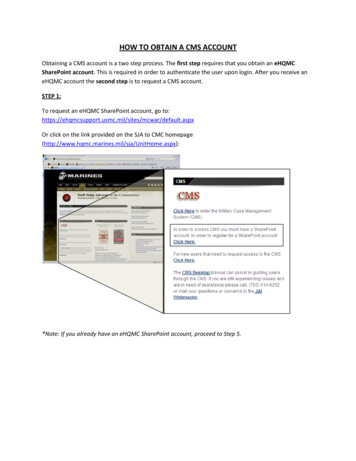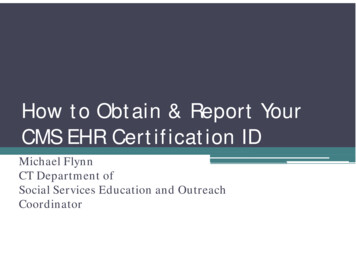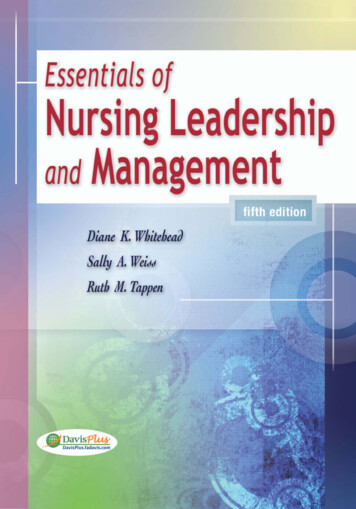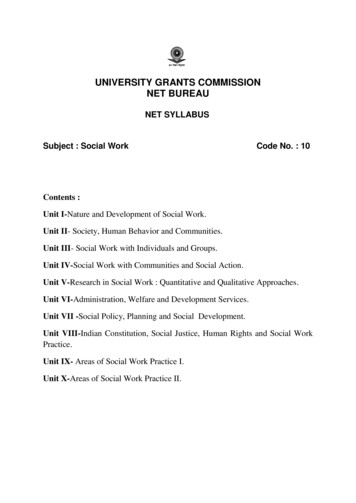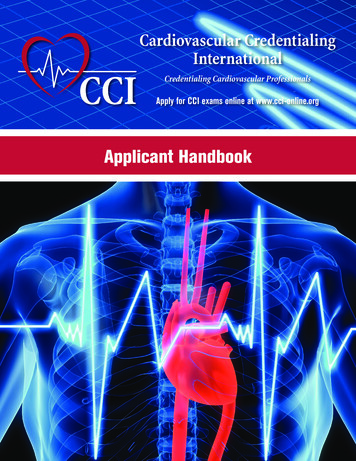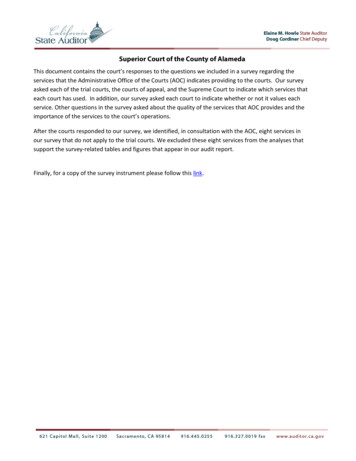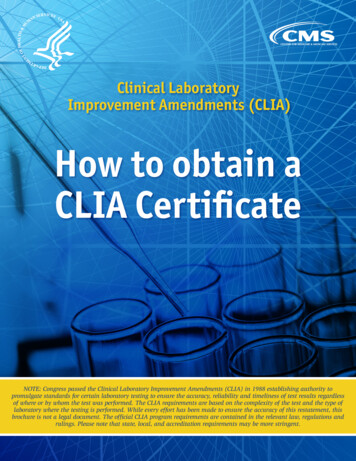
Transcription
Clinical LaboratoryImprovement Amendments (CLIA)How to obtain aCLIA CertificateNOTE: Congress passed the Clinical Laboratory Improvement Amendments (CLIA) in 1988 establishing authority topromulgate standards for certain laboratory testing to ensure the accuracy, reliability and timeliness of test results regardlessof where or by whom the test was performed. The CLIA requirements are based on the complexity of the test and the type oflaboratory where the testing is performed. While every effort has been made to ensure the accuracy of this restatement, thisbrochure is not a legal document. The official CLIA program requirements are contained in the relevant law, regulations andrulings. Please note that state, local, and accreditation requirements may be more stringent.
Do I need to have a CLIA certificate?CLIA generally requires all facilities that perform even oneapplicable test, including waived tests, on “materials derivedfrom the human body for the purpose of providing informationfor the diagnosis, prevention, or treatment of any disease orimpairment of, or the assessment of the health of, human beings”to meet certain Federal requirements. If a facility performs testsfor these purposes, it is considered a laboratory under CLIAand generally must apply and obtain a certificate from the CLIAprogram that corresponds to the complexity of tests performed.However, you may not need a CLIA certificate if your laboratoryis located in the states of New York or Washington, as thoseStates operate their own laboratory regulatory programs. Contact the appropriateState Agency to determine if you need a CLIA certificate.What are the different types of CLIA certificates and how long are they effective?All types of certificates are generally effective for two years, and the different types ofcertificates are: Certificate of Waiver (COW): Issued to a laboratory that performs only waived tests. Certificate for Provider-performed Microscopy (PPM) procedures: Issued to a laboratoryin which a physician, midlevel practitioner or dentist performs specific microscopyprocedures during the course of a patient’s visit. A limited list of provider-performedmicroscopy procedures is included under this certificate type, which are categorizedas moderate complexity testing. Certificate of Registration*: Issued to a laboratory to allow the laboratory to conductnonwaived (moderate and/or high complexity) testing until the laboratory is surveyed(inspected) to determine its compliance with the CLIA regulations. Only laboratoriesapplying for a certificate of compliance or a certificate of accreditation will receive acertificate of registration. Certificate of Compliance (COC): Issued to a laboratory once the State Agency orCMS surveyors conduct a survey (inspection) and determine that the laboratory iscompliant with the applicable CLIA requirements. This type of certificate is issued to alaboratory that performs nonwaived (moderate and/or high complexity) testing. Certificate of Accreditation (COA): Issued to a laboratory on the basis of thelaboratory’s accreditation by an accreditation organization approved by CMS. Thistype of certificate is issued to a laboratory that performs nonwaived (moderate and/orhigh complexity) testing.A registration certificate is valid until an inspection is conducted and compliance is determined.*2
As of the date of this publication’s release, there are seven CMS-approved accreditationorganizations: AABB American Association for Laboratory Accreditation (A2LA) Accreditation Association for Hospitals and Health Systems/ Healthcare FacilitiesAccreditation Program (AAHHS/HFAP) American Society for Histocompatibility and Immunogenetics (ASHI) COLA College of American Pathologists (CAP) The Joint CommissionContact information for the above CMS-approved accreditation organizations is availableon the CMS CLIA website under Accreditation Organizations/Exempt States. If youapply for accreditation by one of the CMS-approved accreditation organizations, youmust concurrently apply to CMS for a COA.What is a waived test?As defined by CLIA, waived tests are categorized as “simple laboratory examinationsand procedures that have an insignificant risk of an erroneous result”. The Food andDrug Administration (FDA) determines which tests meet these criteria when it reviews amanufacturer’s application for test system waiver.Where can I find a list of waived tests?For a list of waived tests sorted by analyte name, visit the FDA website at:CLIA – Currently Waived AnalytesWhere can I find a list of Provider-performed Microscopy Procedures?A list of provider-performed microscopy procedures is available on theCMS CLIA website.Where can I find information about tests categorized as nonwaived (moderateand/or high complexity)?To determine which tests are categorized as waived or nonwaived (i.e., moderate or highcomplexity), refer to the FDA CLIA Database.3
How do I apply for a CLIA certificate?The CLIA application (Form CMS-116) is available online. Send your completedapplication to the address of the local State Agency for the State in which yourlaboratory is located. Additionally, check with your State Agency for any other statespecific requirements. If you do not have online access and do not have informationabout your State Agency, you may contact the CLIA program at 410-786-3531 for theaddress and phone number of your State Agency.Is there any type of laboratory testing of human specimens that is not subject toa CLIA certificate?Yes, there are some testing exceptions that do not require CLIA certification.The following exceptions to CLIA certification apply regardless of a laboratory’slocation: Any laboratory that only performs testing for forensic purposes; Research laboratories that test human specimens but do not report patient-specificresults for the diagnosis, prevention or treatment of any disease or impairment of, orthe assessment of the health of, individual patients; or Laboratories certified by the Substance Abuse and Mental Health ServicesAdministration (SAMHSA), in which drug testing is performed that meets SAMHSAguidelines and regulations. However, a CLIA certificate is needed for all other testingconducted by a SAMHSA-certified laboratory.NOTE: The purpose for which the test is conducted, not the test itself, determineswhether a facility conducting testing is subject to the CLIA requirements. Testing that isused to gather evidence for legal purposes, and is not performed for purposes of clinicaltreatment, medical diagnosis, health assessment or disease prevention is not subject toCLIA.4
Are there any states in whichI do not have to apply for aCLIA certificate?Any laboratory located in astate that has a CMS approvedlaboratory program is exemptfrom CLIA certification.Currently, there are two stateswith approved programs:Washington and New York.New York has a partialexemption; therefore, if yourlaboratory is located in thatstate, contact the New YorkState Agency concerning yourneed for a CLIA certificate.If I have more than one laboratory location, do I need a CLIA certificate for eachlocation?You will need a CLIA certificate for each location where you perform testing, unless youqualify for one of the exceptions listed below: Laboratories that are not at a fixed location; that is, laboratories that move fromtesting site to testing site, such as mobile units providing laboratory testing, healthscreening fairs, or other temporary testing locations may be covered under thecertificate of the designated primary site or home base, using its address. Not-for-profit or Federal, State or local government laboratories that engage in limitedpublic health testing (not more than a combination of 15 moderately complex orwaived tests per certificate) may file a single application. Laboratories within a hospital that are located at contiguous buildings on the samecampus and under common direction may file a single application for the laboratorysites within the same physical location or street address.Contact your State Agency if you have questions or you are filing a single application formore than one testing site.5
What kind of fees do I have to pay for a CLIA certificate? If you apply for a COW or a PPM certificate, you will paya waiver fee or PPM fee every two years. There are noregistration or compliance fees. If you apply for a COC, you will pay a one-time registrationfee that covers the cost of the CLIA enrollment in additionto a compliance survey fee that covers the cost of the initialinspection by the State Agency. CMS will send you a Certificateof Registration. Once compliance has been determined by yourinspection, you will pay a compliance certificate fee to CMSand CMS will send you a COC. A two-year certificate cycle isthen established, and you will pay a compliance survey feeand have a survey every two years. As long as the survey finds your laboratory tobe in compliance, you will pay a compliance certificate fee and CMS will send you arenewed COC. If you apply for a COA, you will pay a registration fee that covers the cost of the CLIAenrollment. Once CMS receives verification from the accreditation organizationthat you have selected, you will pay an accreditation certificate fee and validationsurvey fee to CMS and CMS will send you a COA. A two-year certificate cycle is thenestablished and you will pay an accreditation certificate fee and a validation survey feeevery two years. CMS will send you a renewed COA every two years, as long as yourlaboratory remains compliant. You will also pay fees to the accreditation organization.You can obtain more information concerning the amount of certificate fees from the CMSCLIA website under “CLIA Certificate Fee Schedule” or from your State Agency. Forinformation concerning compliance (survey) fees, you may contact your State Agency oraccreditation organization. These fees are based on the number and types of testing youperform and must cover the cost of the CLIA program becauseCLIA is entirely user fee funded.Will I receive an identifying CLIA number?You will receive a ten-character alpha-numeric code on the CLIA certificate. This numberwill be utilized to identify and track your laboratory throughout its entire history. Youshould use this number when making inquiries to the State Agency and CMS about yourlaboratory.6
When can I begin testing?After you apply for your certificate, you will receive a coupon notifying you of thecorresponding fee. Follow the instructions on the fee coupon for payment. After yourpayment is received, your certificate will be mailed to you. You generally may begintesting once you have received your CLIA certificate, but you need to check with yourState Agency since some states have additional state-based requirements.Will my laboratory receive a CMS survey?Laboratories that have a COW or PPM certificate are not subject to routine surveys.If your laboratory performs any nonwaived testing, the laboratory may have either a COCor COA. All laboratories with either of these certificate types must meet all nonwaivedtesting requirements and are subject to biennial surveys, by CMS or a CMS agent (suchas a surveyor from the State Agency) or by a CMS-approved accreditation organization, ifthe laboratory elects to be accredited. COA laboratories must also meet the requirementsof their accreditation organization which may exceed or be more stringent than the CLIArequirements.Additionally, a limited percentage of laboratories with a COA will receive a validationsurvey by CMS or a CMS agent. This is a survey performed by CMS or a CMS agentto evaluate the results of the most recent survey performed by an accreditationorganization.NOTE: If CMS or the State Agency receives a complaint against your laboratory, you mayreceive an unannounced on-site survey, even though you only perform waived tests orPPM procedures.If I have a certificate for PPM procedures, a certificate of registration, a COA or aCOC, can I also perform waived tests?Yes, these certificates permit laboratories to also perform waived tests.If I have a COA or a COC, can I also perform PPM procedures?Yes, these certificates permit laboratories to perform PPM procedures as well as waivedtests. The certificate you obtain should be for the highest (most complex) category oftesting you perform.7
Do I need to notify anyone if I make any changes in my laboratory?For all types of CLIA certification, you must notify the State Agency within 30 days ofany changes in: Ownership Name Location Laboratory DirectorFor laboratories with a Certificate of Accreditation (COA), you must also notify youraccreditation organization, in addition to the State Agency, within 30 days of anychanges mentioned above.For Certificate of Compliance (COC) laboratories performing high complexity testing, youmust also notify the State Agency within 30 days of any changes in Technical supervisor.If you perform only waived tests and wish to add PPM procedures or other nonwaived(moderate or high complexity) testing to your menu, you must reapply for theappropriate certificate using the same CLIA application (Form CMS-116) you used foryour initial CLIA certification.However, you cannot begin nonwaived testing until you have paid the appropriate fee,and have received the appropriate certificate.If you perform PPM procedures and wish to add other nonwaived (moderate or highcomplexity) testing, you must first apply for the appropriate certificate.If you have a COC or COA and wish to add tests categorized under a different laboratoryspecialty or subspecialty than those on your current certificate or that employ a differenttest method from those you are already performing, you must notify the State Agency orthe accreditation organization of the new testing.If I have any questions about my certificate or changes in my test menu, whomshould I contact?You should contact the State Agency where your laboratory is located.8
Where can I find additional information and guidance?Refer to the “State Operations Manual,” Appendix C – Interpretive Guidelines (CMSPublication 7) available on the CMS website. Links to other laboratory-related resourcescan be found at these websites:CLIA Law & RegulationsCDC CLIA websiteFDA CLIA websiteYou can also email questions to the CMS Lab Excellence mailbox at:LabExcellence@cms.hhs.gov9
Hyperlink TableEmbedded HyperlinkComplete URLState /Legislation/CLIA/Downloads/CLIASA.pdfList of Provider-performedMicroscopy itation OrganizationsExempt /Legislation/CLIA/Accreditation Organizations and Exempt States.htmlCLIA – Currently Waived h/cfdocs/cfClia/analyteswaived.cfmCMS PPMP List e/Legislation/CLIA/Downloads/ppmplist.pdfFDA CLIA h/cfdocs/cfCLIA/search.cfmForm Forms/Downloads/CMS116.pdfCMS CLIA e/Legislation/CLIA/index.html?redirect /CLIA/CLIA Certificate Fee ce/Legislation/CLIA/Downloads/CLIA certificate fee schedule.pdfAccreditation idance/Legislation/CLIA/Downloads/AOList.pdfState Operations /Guidance/Manuals/Downloads/som107ap c lab.pdfCLIA Law & fault.aspxCDC CLIA websitehttps://wwwn.cdc.gov/clia/default.aspxFDA CLIA 105.htmMarch 201910
treatment, medical diagnosis, health assessment or disease prevention is not subject to CLIA. Form CMS-116. State Agency. State Agency. State Agency. State Agency. 5. Are there any states in which I do not have to apply for a CLIA certificate? Any laboratory located in a state that has a CMS approved
